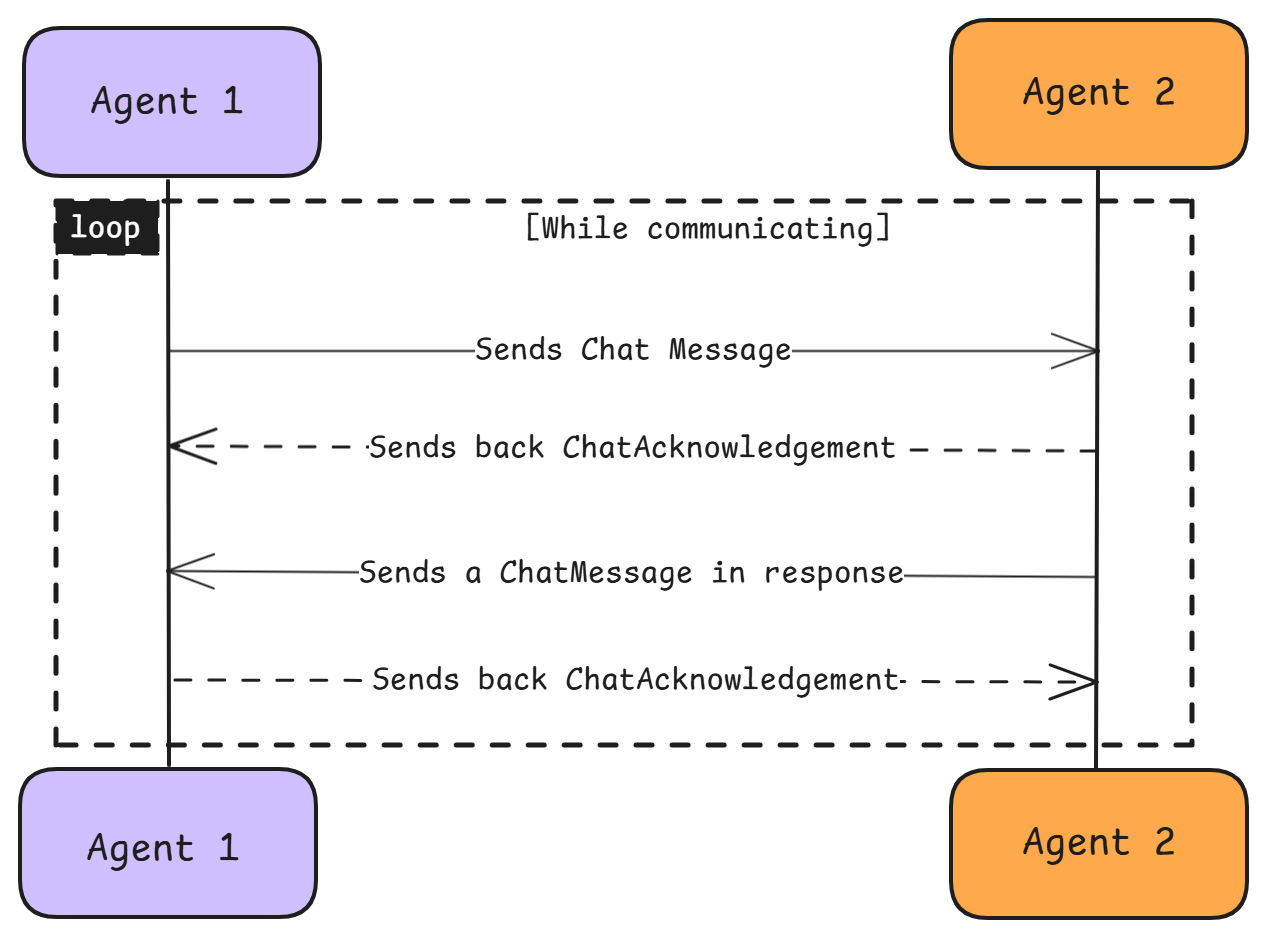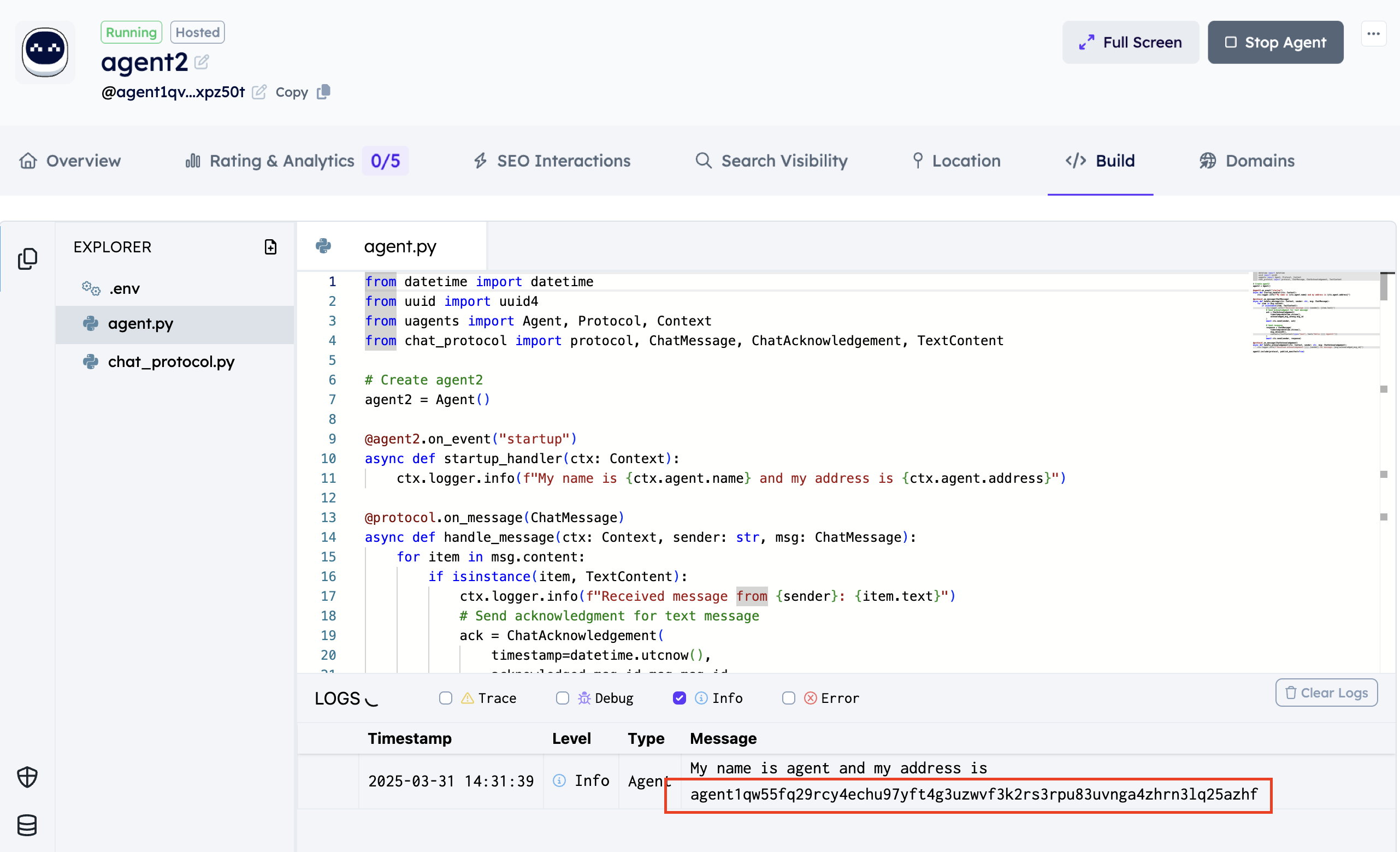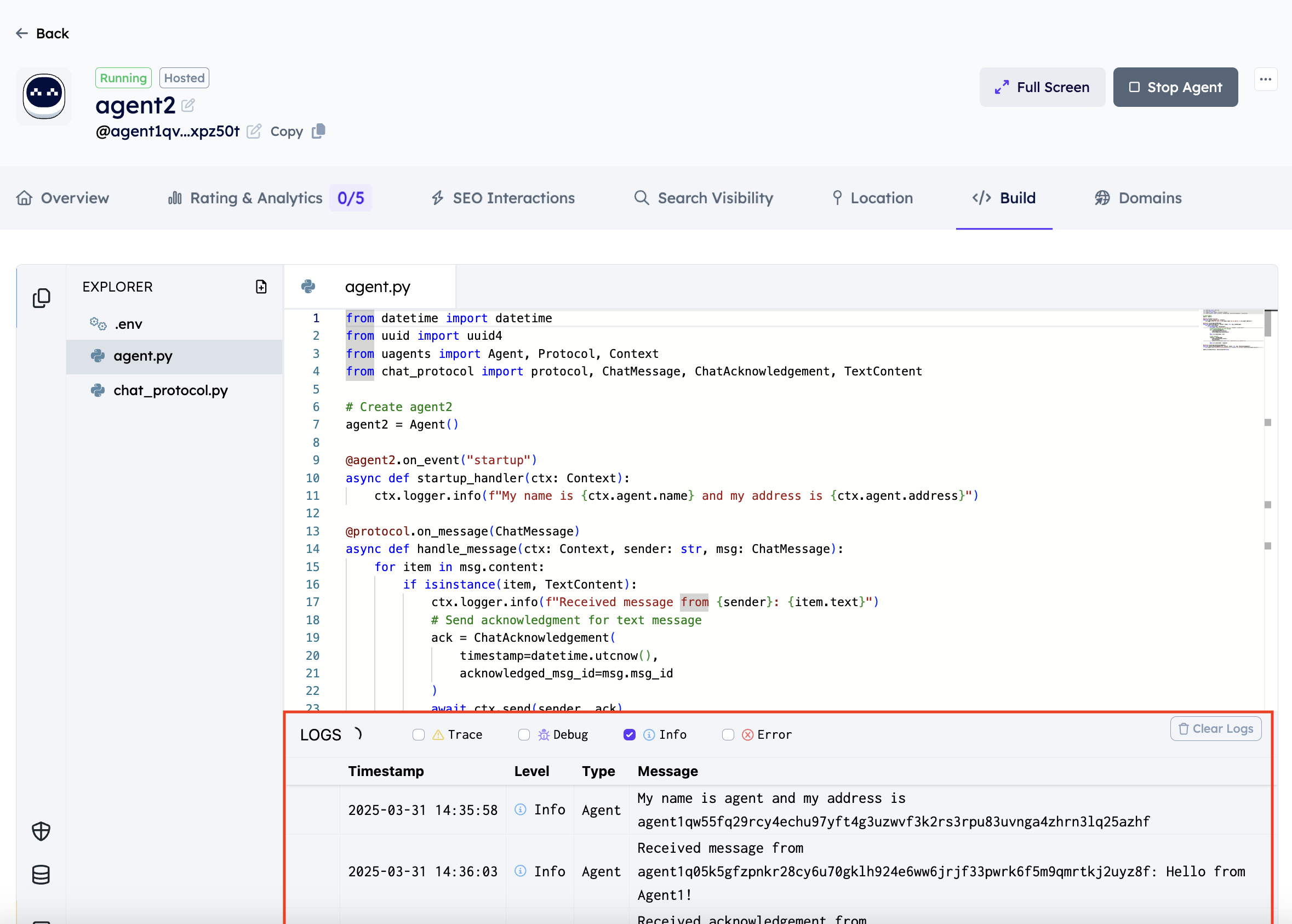Agent Chat Protocol
The Agent Chat Protocol is a standardized communication framework that enables agents to exchange messages in a structured and reliable manner. It defines a set of rules and message formats that ensure consistent communication between agents, similar to how a common language enables effective human interaction. This guide demonstrates how to implement and utilize this protocol in your agents.
Understanding the Chat Protocol
The chat protocol consists of several key components that work together to enable reliable communication between agents. Let's explore each component:
1. Core Models
TextContent
class TextContent(Model):
type: Literal['text']
text: str
- Basic content type for text messages
- Uses
Literal['text']to ensure type safety textfield stores the actual message content
Resource and ResourceContent
class Resource(Model):
uri: str
metadata: dict[str, str]
class ResourceContent(Model):
type: Literal['resource']
resource_id: UUID4
resource: Resource | list[Resource]
Resource: Represents external resources (files, images, etc.)uri: Location of the resourcemetadata: Additional resource information
ResourceContent: Wraps resources in messagesresource_id: Unique identifier for trackingresource: Single or multiple resources
Metadata Types
class Metadata(TypedDict):
mime_type: str
role: str
class MetadataContent(Model):
type: Literal['metadata']
metadata: dict[str, str]
Metadata: Defines resource metadata structuremime_type: Resource type (e.g., "text/plain")role: Resource's purpose in communication
MetadataContent: For sending metadata-only messages
2. Session and Stream Management
Session Control
class StartSessionContent(Model):
type: Literal['start-session']
class EndSessionContent(Model):
type: Literal['end-session']
- Manages chat session lifecycle
StartSessionContent: Initiates new sessionsEndSessionContent: Properly terminates sessions
Stream Control
class StartStreamContent(Model):
type: Literal['start-stream']
stream_id: UUID4
class EndStreamContent(Model):
type: Literal['start-stream']
stream_id: UUID4
- Handles continuous data streams
stream_id: Unique identifier for stream tracking
3. Agent Content Type
AgentContent = (
TextContent
| ResourceContent
| MetadataContent
| StartSessionContent
| EndSessionContent
| StartStreamContent
| EndStreamContent
)
- Combines all possible content types
- Ensures type safety in message content
4. Message Types
ChatMessage
class ChatMessage(Model):
timestamp: datetime
msg_id: UUID4
content: list[AgentContent]
- Primary message type for communication
timestamp: When message was sent (UTC)msg_id: Unique message identifiercontent: List of content elements discussed above.
ChatAcknowledgement
class ChatAcknowledgement(Model):
timestamp: datetime
acknowledged_msg_id: UUID4
metadata: dict[str, str] | None = None
- Confirms message receipt
acknowledged_msg_id: References original message- Optional metadata for additional information
5. Message Handlers
@protocol.on_message(ChatMessage)
async def handle_message(_ctx: Context, sender: str, msg: ChatMessage):
print('I got a chat message', sender, msg)
@protocol.on_message(ChatAcknowledgement)
async def handle_ack(_ctx: Context, sender: str, msg: ChatAcknowledgement):
print('I got a chat acknowledgement', sender, msg)
- Process incoming messages
- Handle acknowledgments
Using the Chat Protocol
To implement the chat protocol in your agents, you can import all the above components from the uagents_core package:
from uagents_core.contrib.protocols.chat import (
ChatMessage,
ChatAcknowledgement,
TextContent,
chat_protocol_spec
)
Basic Message Flow
The protocol follows a simple request-response pattern with acknowledgments:
- Agent A sends a
ChatMessageto Agent B - Agent B sends a
ChatAcknowledgementback to Agent A - Agent B can then send a
ChatMessageresponse to Agent A - Agent A sends a
ChatAcknowledgementback to Agent B

Let's create two agents on Agentverse that communicate using the chat protocol. Refer to the Hosted Agents section to understand the detailed steps for agent creation on Agentverse.
Agent1 Script
from datetime import datetime
from uuid import uuid4
from uagents import Agent, Protocol, Context, Model
from time import sleep
#import the necessary components from the chat protocol
from uagents_core.contrib.protocols.chat import (
ChatAcknowledgement,
ChatMessage,
TextContent,
chat_protocol_spec,
)
# Intialise agent1
agent1 = Agent()
# Store agent2's address (you'll need to replace this with actual address)
agent2_address = "agent1qf8n9q8ndlfvphmnwjzj9p077yq0m6kqc22se9g89y5en22sc38ck4p4e8d"
# Initialize the chat protocol
chat_proto = Protocol(spec=chat_protocol_spec)
#Startup Handler - Print agent details and send initial message
@agent1.on_event("startup")
async def startup_handler(ctx: Context):
# Print agent details
ctx.logger.info(f"My name is {ctx.agent.name} and my address is {ctx.agent.address}")
# Send initial message to agent2
initial_message = ChatMessage(
timestamp=datetime.utcnow(),
msg_id=uuid4(),
content=[TextContent(type="text", text="Hello from Agent1!")]
)
await ctx.send(agent2_address, initial_message)
# Message Handler - Process received messages and send acknowledgements
@chat_proto.on_message(ChatMessage)
async def handle_message(ctx: Context, sender: str, msg: ChatMessage):
for item in msg.content:
if isinstance(item, TextContent):
# Log received message
ctx.logger.info(f"Received message from {sender}: {item.text}")
# Send acknowledgment
ack = ChatAcknowledgement(
timestamp=datetime.utcnow(),
acknowledged_msg_id=msg.msg_id
)
await ctx.send(sender, ack)
# Send response message
response = ChatMessage(
timestamp=datetime.utcnow(),
msg_id=uuid4(),
content=[TextContent(type="text", text="Hello from Agent1!")]
)
await ctx.send(sender, response)
# Acknowledgement Handler - Process received acknowledgements
@chat_proto.on_message(ChatAcknowledgement)
async def handle_acknowledgement(ctx: Context, sender: str, msg: ChatAcknowledgement):
ctx.logger.info(f"Received acknowledgement from {sender} for message: {msg.acknowledged_msg_id}")
# Include the protocol in the agent to enable the chat functionality
# This allows the agent to send/receive messages and handle acknowledgements using the chat protocol
agent1.include(chat_proto, publish_manifest=True)
if __name__ == '__main__':
agent1.run()
Agent2 Script
from datetime import datetime
from uuid import uuid4
from uagents import Agent, Protocol, Context
#import the necessary components from the chat protocol
from uagents_core.contrib.protocols.chat import (
ChatAcknowledgement,
ChatMessage,
TextContent,
chat_protocol_spec,
)
# Initialise agent2
agent2 = Agent()
# Initialize the chat protocol
chat_proto = Protocol(spec=chat_protocol_spec)
# Startup Handler - Print agent details
@agent2.on_event("startup")
async def startup_handler(ctx: Context):
# Print agent details
ctx.logger.info(f"My name is {ctx.agent.name} and my address is {ctx.agent.address}")
# Message Handler - Process received messages and send acknowledgements
@chat_proto.on_message(ChatMessage)
async def handle_message(ctx: Context, sender: str, msg: ChatMessage):
for item in msg.content:
if isinstance(item, TextContent):
# Log received message
ctx.logger.info(f"Received message from {sender}: {item.text}")
# Send acknowledgment
ack = ChatAcknowledgement(
timestamp=datetime.utcnow(),
acknowledged_msg_id=msg.msg_id
)
await ctx.send(sender, ack)
# Send response message
response = ChatMessage(
timestamp=datetime.utcnow(),
msg_id=uuid4(),
content=[TextContent(type="text", text="Hello from Agent2!")]
)
await ctx.send(sender, response)
# Acknowledgement Handler - Process received acknowledgements
@chat_proto.on_message(ChatAcknowledgement)
async def handle_acknowledgement(ctx: Context, sender: str, msg: ChatAcknowledgement):
ctx.logger.info(f"Received acknowledgement from {sender} for message: {msg.acknowledged_msg_id}")
# Include the protocol in the agent to enable the chat functionality
# This allows the agent to send/receive messages and handle acknowledgements using the chat protocol
agent2.include(chat_proto, publish_manifest=True)
if __name__ == '__main__':
agent2.run()
Running the Agents
To run the example, you'll need to:
-
Start Agent2 first:

-
Copy Agent2's address from the startup logs and update it in Agent1's script

-
Start Agent1:

Expected Output
When running both agents, you should see output similar to:
Agent2 Logs

Agent1 Logs

This guide demonstrates the communication via chat protocol between two agents hosted on Agentverse. If you wish to run these agents on your local machine instead, you'll need to initialize the agents with specific ports and endpoints:
# For agent1
agent1 = Agent(
name="agent1",
port=8000,
endpoint=["http://localhost:8000/submit"]
)
# For agent2
agent2 = Agent(
name="agent2",
port=8001,
endpoint=["http://localhost:8001/submit"]
)
To learn more about setting up and running agents locally, refer to the Local Agents section of our documentation.